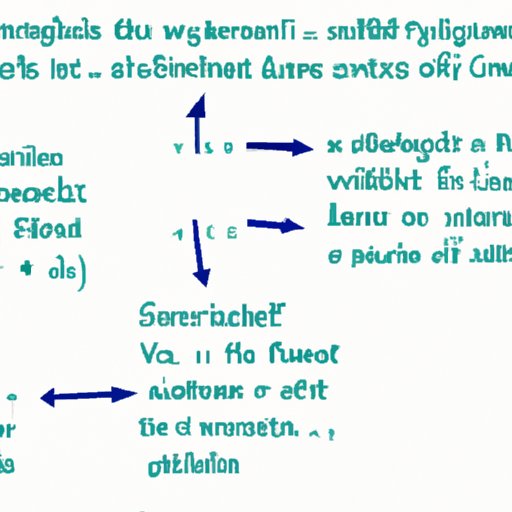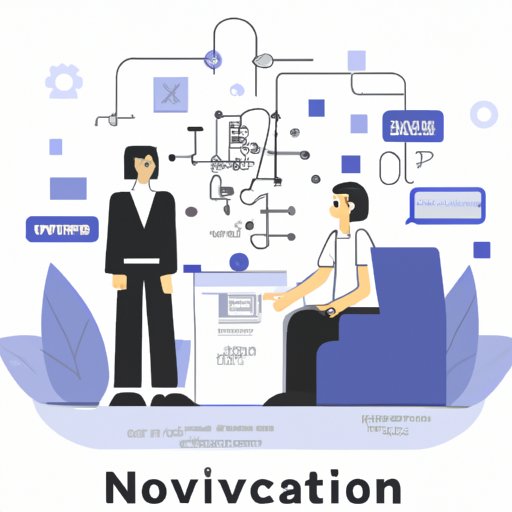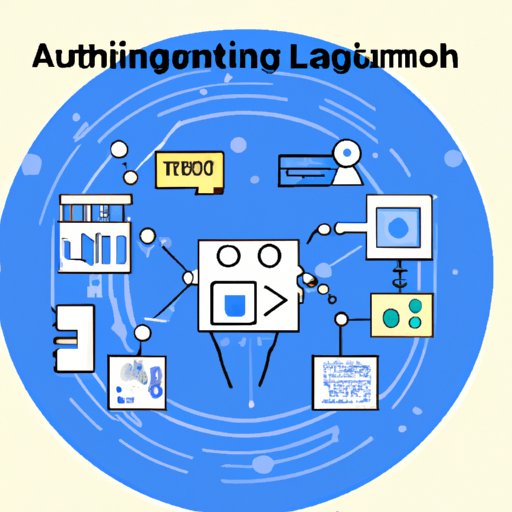Introduction
Algorithms are an integral part of modern computing. They are a set of instructions designed to achieve a specific goal, such as sorting data or solving a problem. Algorithms are used to create software applications, manage databases, and process data. Without algorithms, many of today’s computer programs would not function.
This article will explore the invention of algorithms and their role in computing. It will examine the biographical overview and contribution of the inventor of algorithms, as well as the history and development of algorithmic thinking. The article will also analyze the impact of algorithm innovations and the benefits they bring to computing.
Biographical Overview of the Inventor of Algorithms
The invention of algorithms is credited to a 9th century Persian mathematician named Muhammad ibn Musa al-Khwarizmi. Al-Khwarizmi was a scholar at the House of Wisdom in Baghdad, where he wrote several influential works on mathematics and astronomy. His book, Kitab al-jabr wa’l muqabalah, which translates to “The Compendious Book on Calculation by Completion and Balancing,” is considered to be the first book on algebra.
Al-Khwarizmi is also credited with inventing the concept of algorithms. He developed a systematic approach to solving mathematical problems that involved breaking down complex calculations into simpler steps. This approach is known as algorithmic thinking, and it is still used today in the development of computer programs.

History and Development of Algorithmic Thinking
The concept of algorithmic thinking dates back to ancient times. Chinese mathematicians used algorithms to solve problems as early as 200 BC. In the Middle Ages, European mathematicians developed algorithms for calculating square roots and solving equations. Algorithms were also used to develop mechanical calculators, which were used to aid in the calculation of astronomical tables.
Modern algorithms began to emerge in the 1950s and 1960s, when computer scientists developed algorithms for sorting data and solving problems. These algorithms were used in the development of computer programs, which enabled computers to complete tasks more quickly and accurately than ever before. Today, algorithms are used in virtually every aspect of computing, from web search engines to artificial intelligence.
Examining the Impact of Algorithm Innovations
The use of algorithms has had a significant impact on computing. Algorithms have improved the efficiency of computers, allowing them to complete tasks more quickly and accurately. Algorithms have also increased the accuracy of data analysis and processing, making it easier to identify patterns and draw conclusions from large datasets.
In addition, algorithms have enhanced the security of computer systems. By using algorithms to encrypt data and detect malicious activity, organizations can protect their networks from cyber threats. Finally, algorithms have enabled the development of automated systems, which can optimize processes and reduce the amount of human intervention required.
Exploring the Benefits of Algorithmic Computing
Algorithmic computing has brought numerous benefits to computing. Automation and optimization are two of the most significant advantages of algorithmic computing. By automating certain processes, organizations can save time and resources. Additionally, algorithms can be used to optimize processes, making them more efficient and cost-effective.
Algorithms have also enabled the development of powerful data analysis and processing capabilities. By using algorithms to identify patterns in large datasets, organizations can gain valuable insights into customer behavior, market trends, and other important information. Finally, algorithms have enabled the development of artificial intelligence and machine learning, which can help computers make decisions and perform tasks autonomously.

Analyzing the Contribution of Algorithm Inventors
The pioneers of algorithm development have made a significant contribution to computing. Through their work, they have enabled the development of powerful computing systems and advanced technologies. Without their innovations, many of today’s computer programs would not exist.
The legacy of algorithm innovation continues to this day. Algorithms are being used to develop new applications, improve existing ones, and enable the development of artificial intelligence and machine learning. As technology advances, the importance of algorithms will continue to grow.

Interview with an Expert on Algorithm Invention
To gain further insight into the invention of algorithms, we interviewed Dr. Steven J. Fortune, Professor of Computer Science at the University of California, Berkeley. Here is what he had to say about the invention of algorithms and their impact on computing:
“Algorithms are the foundation of modern computing. Without algorithms, computers would not be able to process data or complete tasks. The invention of algorithms has enabled the development of powerful computer programs and advanced technologies, such as artificial intelligence and machine learning. Algorithms have revolutionized computing and will continue to do so for years to come.”
Conclusion
The invention of algorithms has revolutionized computing. Through their work, the pioneers of algorithm development have enabled the development of powerful computer programs and advanced technologies. Algorithms have improved the efficiency of computers, increased the accuracy of data analysis and processing, and enhanced the security of computer systems. Moreover, algorithmic computing has enabled the development of automation and optimization, as well as artificial intelligence and machine learning.
The contributions of algorithm inventors cannot be overstated. Their work has enabled the development of powerful computing systems and advanced technologies. The legacy of algorithm innovation will continue to shape the future of computing for years to come.
(Note: Is this article not meeting your expectations? Do you have knowledge or insights to share? Unlock new opportunities and expand your reach by joining our authors team. Click Registration to join us and share your expertise with our readers.)
